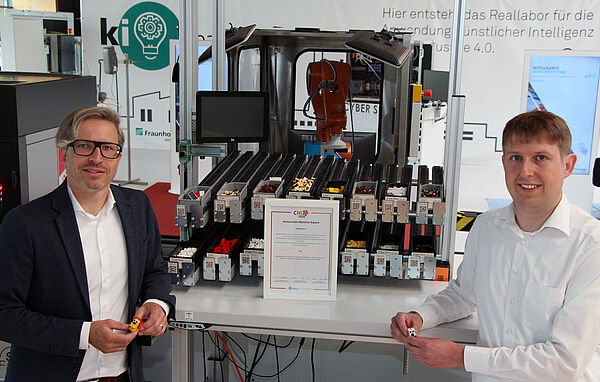Augmented reality (AR), i.e. the computer-aided extension of reality, not only promises a lot of fun and extraordinary experiences in the gaming world, but is now also being used as an important component in industry and business. Manual workstations in the factory of the future are equipped with an interactive interface that guides the employee through the assembly process of a product via hand tracking and projection. The Institute for Industrial Information Technology (inIT) has now investigated the extent to which new employees can be trained with the help of these assistance systems.
In cooperation with the Clausthal University of Technology, a study was conducted with a total of 33 test subjects. It was observed how the test subjects learn the assembly process over several days with the help of an AR assistance system and how quickly knowledge was built up. This was compared with a group of subjects learning the process via paper instructions and a group of subjects being taught the process via instructions from a foreman. Sebastian Büttner, research associate at inIT, summarizes the results in his paper "Augmented Reality Training for Industrial Assembly Work - Are Projection-based AR Assistive Systems an Appropriate Tool for Assembly Training?". "On the first day, we initially could not detect any differences between the three groups. However, at the beginning of the second day, it became apparent that the group where training was provided by a foreman still knew significantly more about the assembly process than the other two groups. Consequently, the familiarization time of this group was the shortest on the second day and also overall. The average training time using AR assistance system was between the training time by a foreman and the group that learned with paper instructions. However, the assistance system group showed no significant time differences from either of the other two groups. After one week, we again tested the subjects' knowledge. Here we found that knowledge retention was independent of the learning method used. Furthermore, we found that when using the paper instructions, several subjects had systematically learned something incorrectly. When learning with our AR assistance system, this could be avoided, since hand tracking allows potential errors to be detected directly by the system and the employee is made aware of them. He thus receives an indication even before the error is made that the step to be taken must be a different one," says Büttner, giving an insight into the results.
Büttner and his co-authors Professor Michael Prilla from TU Clausthal and Professor Carsten Röcker from inIT, submitted their paper to the most prestigious conference in the field of human-computer interaction, the "ACM Conference on Human Factors in Computing Systems (CHI)", and were awarded the "Honorable Mention Award". This puts them in the top 5% of the 3,126 publications submitted. However, due to the Corona pandemic, the conference could not take place in Honolulu, Hawaii, from April 25 to 30 as planned. Nevertheless, the paper was presented at the end of May as part of the "Virtual German CHI Week 2020". At this virtual conference, all the papers that were written at German research institutions and should have been presented in Hawaii were presented and discussed in three-minute videos.
"Of course, it is a great pity that the conference could not take place as planned. Nevertheless, we are very happy about this award and proud of our work," Sebastian Büttner is pleased. For him and his team, this concludes the study. Now, however, the research question follows as to how such assistance systems can be further developed so that they are more suitable for training an employee and how the system can better adapt to the person and impart knowledge. "We will continue to research this topic with the aim of making the systems as adaptive as possible," says Büttner, looking to the future.


